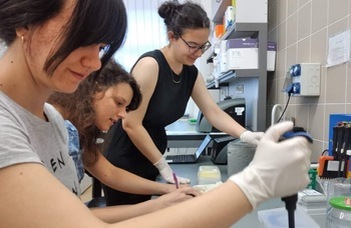Cancer treatment method developed by ELTE students wins a gold medal
The iGEM (International Genetically Engineered Machine) Competition founded by MIT (the Massachusetts Institute of Technology) is an international project-based contest for teams of biology, biotechnology, and bioengineering students. The competition was organised for the 19th time in 2022. The event held in Paris last year was attended by 7,000 students and 330 teams from 46 countries worldwide. The university students had to tackle socially important projects and problems with the tools of synthetic biology.
In the history of the competition, there have been no Hungarian contestants so far. ELTE iGEM team – the first group of students to represent Hungary – involves nine enthusiastic and talented MSc students, Adrienn Biró, Zsóka Csorba, Laura Dénes, Nikolett Emődi, Englert Dóra Fanni, Golarits Ágnes, Kapui Dóra, Laura Király, and Péter Márton Nyiri. Most of them are students enrolled in the small-group Biotechnology MSc programme jointly launched by ELTE and the Budapest University of Technology (BME), and funded by Gedeon Richter Plc. The 2018 launch of the Master’s in Biotechnology was supported, among others, by the National Research, Development and Innovation Office (NKFIH), as the training is focused on the production of protein-based medicines, which is one of the most dynamically developing sectors of technology today.

The ELTE iGEM team at the competition in Paris
The ELTE iGEM team is developing a selective, light-inducible tumour diagnostic and therapy system. The method is called NanoBlade. The bacteria, genetically modified by the students, will be able to recognise and detect cancerous tissues and destroy them on exposure to blue light. For this, they developed a so-called nanobody, a small protein that can selectively attach to the surface of tumour cells. After the tumour cells have been detected and
illuminated with blue light, the microbe releases a cytotoxic protein in the tumour environment killing cancer cells locally.
From the beginning, the team has enjoyed the support of Dr. Imre Kacskovics, Dean of ELTE Faculty of Sciences and founder of the Biotechnology Master’s programme. Dr. László Nyitray, former Head of the ELTE Department of Biochemistry, acted as a professional mentor. Gedeon Richter Plc., being the main financial supporter of the team, followed the students’ work with great interest. On behalf of Richter, Dr. Erik Bogsch, Jr., Director of the Biotechnology Business Unit, and Dr. Zoltán Urbányi found the team’s unique project promising from the onset and considered it worthy of financing their competition-related costs. In the field of molecular biology, the development tasks were carried out by Laura Dénes and Ágnes Golarits, while the in vitro experiments were coordinated by Laura Király and Zsóka Csorba.

Work in the laboratory with blue light.
In addition to teamwork, the iGEM competition provided sufficient scope for individual development, as well. In the project, Péter Márton Nyiri was responsible for collaborations. He maintained contact with nine other teams, established relations across time zones, and organised a mini-conference for Eastern European teams. Nikolett Emődi designed and programmed the website of the project with labour-intensive work lasting a month and a half. Laura Király explored whether the project was socially useful and assessed how the professional community felt about it. For this purpose, a questionnaire survey was developed and in-depth interviews were made with researchers, experts, and doctors. Fanni Englert designed and built the instruments vital for testing protein production activated by blue light. It was also her who prepared the promotional video presenting the project. In addition to the activities above, the students had numerous other tasks during the several months of preparation.

The iGEM team of the ELTE Biotechnology Master’s programme.
“One swallow doesn’t make a summer, but we are confident that we have encouraged many students to undertake ventures, be creative, and take part in iGEM or similar initiatives. In other countries, especially in the world’s best universities, there is already a huge tradition of participation in the competition, which played a key role in raising a very resourceful, creative, socially sensitive, community-minded generation of researchers that may as well contribute to the development of their country,” said Zsóka Csorba, leader of the ELTE iGEM team.
Dean Imre Kacskovics and Zsóka Csorba, leader of the team, talk about the development in the Science Podcast that is in Hungarian.

